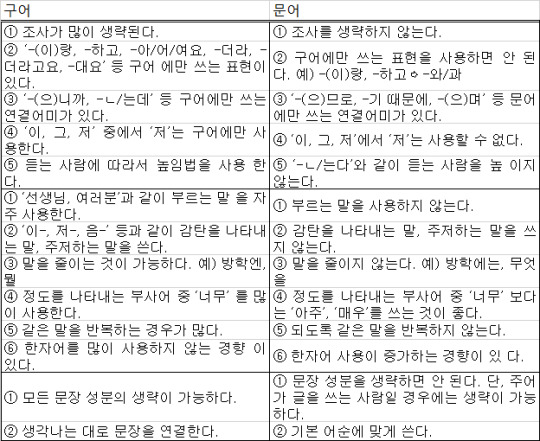Text
Intermediate Korean Vocabulary Spreadsheet
I made a spreadsheet of every single word I’ve learned in my third year of Korean at uni. They’re classified by category.
The categories are: 집안의 일상, 직장 생활, 언어와 문화, 스트레스, 여행의 감동, 결혼, 공연감상, 교육, 환경, 컴퓨터, 인터냇
144 notes
·
View notes
Text
I’m leaving this chart here for anyone who wants to know more about the difference between spoken & written Korean! Obvs you have to be able to read in Korean but it’s a really helpful chart and many people have asked me about this before and I gave kind of lackluster answers so…here’s the real break down of how they differ!

I will also provide some examples of turning written > spoken or spoken > written.
(SPOKEN > WRITTEN)
SPOKEN: 엄마한테 용돈을 달라고 하고 싶은데 어떻게 말해야 하지?
WRITTEN: 어머니에게 용돈을 달라고 하고 싶은데 어떻게 말해야 하는가?
SPOKEN: 음… 친구 만나 뭐 할까?
WRITTEN: 친구를 만나 무엇을 하는가?
SPOKEN: 아, 쓰레기 문제가 심각하네요 정말.
WRITTEN: 쓰레기 문제가 매우 심각하다.
SPOKEN: 이번 주말엔 할일이 너무너무 많아.
WRITTEN:이번 주말에는 할 일이 아주 많다.
(WRITTEN > SPOKEN)
WRITTEN: 최근 환경문제가 매우 심각하므로 모두가 머리를 맞대고 대책을 세워야 한다.
SPOKEN: 요즘 환경문제가 너무 심각하니까 모두가 머리(를) 맞다고 대책(을) 세워야 돼(요)
WRITTEN: 이러한 행동은 간과해서는 안 될 것이다.
SPOKEN: 이런 행동 봐주면 안 돼(요)
WRITTEN: 다시는 유사한 실수를 반복하지 않도록 각별한 주의 바란다.
SPOKEN: 같은 실수 다시 하지 않게 조심해(요)
WRITTEN: 봄이 되면 여의도는 꽃구경을 가려는 인파로 북적이게 된다.
SPOKEN: 봄 되면 꽃구경 하러 여의도 가는 사람들(이) 많아(요)
Hopefully this gives you a feeling for how they are different!
1K notes
·
View notes
Text
Advanced Grammar: V느라고 V는데 (or V느라고 하는데)
"I do do V, but..." "Despite the fact that I..."
공부하느라고 하는데 성적이 안 느네요. I do study, but my grades aren't getting better.
자느라고 자는데 하루 종일 피곤해요. I do sleep, but I'm tired all day.
깨끗하게 하느라고 했는데 아직 좀 지저분하네. I did try hard to clean up, but it's still messy.
Note: some Koreans will tell you that the correct form of this is V노라고 V는데 because ~노라고 implies that the speaker has made an effort to do something. My teacher uses ~느라고 ~는데 and says it is correct though.
176 notes
·
View notes
Text
Useful Adverbs
Manner:
매우- very
아주- very
혼자- alone
함께- together
상당히- quite
진짜로- really
실제로- really
빨리- quickly
제대로- well
잘- well
열심히- hard
천천히- slowly
신중하게- carefully
거의- hardly
간신히- barely
가까스로- barely
주로- mostly
전적으로- absolutely
Time:
오늘- today
어제- yesterday
내일- tomorrow
매일- everyday
지금- now
그때- then
나중에- later
후에- later
바로- immediately
즉시- immediately
곧- soon
이미- already
최근에- recently
요즘- recently, these days, lately
아직(도)- still, yet
전에- ago
다음- next
지난- last
Frequency:
절대- never
드물게- rarely
가끔- sometimes
보통- usually
대개- usually
항상- always
늘- always
자주- frequently
흔히- frequently
Place:
여기- here
저기- there, over there
거기- there
저쪽에- over there
모든곳- everywhere
어디나- everywhere
어디든- anywhere
아무데나- anywhere
아무데도- nowhere
어디에도- nowhere
떨어져- away
바깥에- out (out there)
–Ana

5K notes
·
View notes
Text
Conjunctions in Korean
사실 - Actually
그리고 - And, And then
왜냐하면 - Because
때문에 - Because of
그래도 - But still, Nonetheless, However
그런데 - By the way, So, But
하지만 - However, But
만약 - If, In case
그러면 - In that case, If so, Then
그렇지만 - One the other hand, However
아니면 - Or
그래서 - So, Therefore
그럼 - Then, Sure
그러니까 - Therefore, So
5K notes
·
View notes
Text
Masterlist

I decided to create a master list of all my blog posts. I only included the ones I wrote myself, you won’t find any reblogged posts here :)
GETTING STARTED
# How To Start Studying Korean
# Study Technique (Ask)
# Study Notebook (Ask)
MISCELLANEOUS
# Introduction
# The Issue With Calling People Koreaboo - A Short Essay
# Life Update (October 2019)
# 5 Things That Make Me Happy
GRAMMAR
# Important Grammar - Ending Consonants - 받침
# Beginner Grammar - To Have To Do Sth./Should Do Sth. -~아/어/여야 하다/되다
# Beginner Grammar - Nominalisation -는 것 & -기 & -(으)ㅁ
# Beginner Grammar - About Sth./Concerning Sth. -에 대해(서) & -에 관해(서)
# Beginner Grammar - If/When -(으)면 & -(으)ㄹ 때
# Intermediate Grammar - Speaker’s Assumption -(으)ㄹ 텐데
# Confusing Grammar 1 - Shall We…?/Doubts/Asking Oneself/Wondering -(으)ㄹ까(요)?
# Confusing Grammar 2 - Some-(one/time/where) -ㄴ가
# Confusing Grammar - If/When -(으)면 & - (으)ㄹ 때
# Confusing Grammar - Usage of 보다 in BTS and TXT song (Ask)
VOCABULARY
# Adverbs of Frequency
# Vocabulary - Nature
# Vocabulary - Halloween
# Random Vocabulary 1
374 notes
·
View notes
Text
🎐concerning something - ~에 대해(서) and ~에 관해(서)🎐
Requested by @spiderlilysss . Thank you so much for requesting! I hope the following explanation can help you.♡

🎨 How to translate -에 대해 or -에 대해서 when you stumble across that pattern?
‘-에 대해(서)’ means 'about' or 'concerning'.
It is used when you want to talk about something relating to a specific topic (e.g. I have been thinking a lot about that book recently -> 요즘은 그 책(n., the book)에 대해 많이 생각해요.)
🎨 How to use -에 대해(서) in a sentence?
Just like I mentioned before, the speaker uses -에 대해(서) to talk about something.
To use it within a sentence you only have to add '-에 대해(서)' to the topic when it is followed by a verb, and ‘-에 대한’ when it is followed by nouns.
Ex.:
그 책은 무엇에 대한 책이에요? (= What is that book about?)
🎨 What is the difference between -에 대해(서) and -에 관해(서)?
There is none. Both particles are 100% interchangeable.
Ex.: ('What do you think about me?')
저에 대해서 어떻게 생각해요?
저에 관해서 어떻게 생각해요?

Sources: koreantutors | koreanclass101 Forum
a/n: I hope this was helpful! I am taking requests currently so feel free to drop something in my inbox ♡
43 notes
·
View notes
Text
youtube
Hope it's helpful to everyone who is just starting out!!
#study aesthetic#study notes#study motivation#study korean#language#korean#korean language#language tips#study languages#self study#Youtube
1 note
·
View note